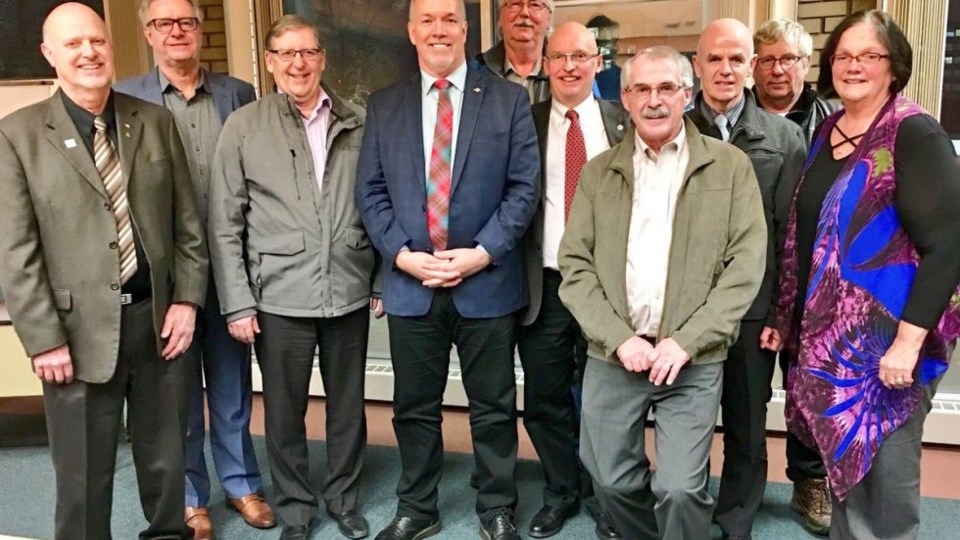Local mayors and regional district staff met this weekend with Premier John Horgan in Prince George to discuss such issues as lumber markets and softwood duties; timber supply in the wake of last summer's wildfires and increasing beetle infestations; and the pending legalization of marijuana.
The purpose of the meeting, spearheaded by Quesnel mayor Bob Simpson and hosted by Prince George mayor Lyn Hall, was to open up the lines of communication between the provincial government and a collected group of local governments in the north central B.C.
In co-ordinating the meeting, Simpson focused specifically on Prince George, Quesnel and Mackenzie - the three pulp mill locations – and the areas which provide fibre for those mills.
“With the whole issue of the changing timber supply, what can we do to avoid what happened on the coast, where the manufacturing sector collapsed because the governments of the day didn’t start answering the questions of what kinds of investments do we need in the manufacturing centre to match the changes that are happening on the land base?” said Simpson. “That’s a real conversation we want to have with this government. What kinds of investments can we incent, what kinds of markets do we need to put in? That’s why the pulp mills become so important, because we’ll be shifting away from that sawlog predominance. Can our pulp mills and our panels plants shift into different markets and get more out of that declining sawlog fibre basket that we’ve got.”
Hall considered the 90-minute meeting Friday evening productive and he will continue to have discussions with the premier and his cabinet ministers as well as Liberal MLAs Shirley Bond and Mike Morris to ensure the province is looking out for the best interests of north central B.C.
"We've had ministers here over the last three months or so, specifically around the wildfire evacuation process we were handling here, and we just wanted to make sure we got our message out about what's happening in this area," said Hall.
"Of great interest to the Cariboo is how they get in to harvest that timber that's been burnt. There's still salvageable timber in there, not all of it is destroyed. We talked about lumber markets and what's available to British Columbia - are they pursuing other markets. From Prince George's perspective, the foundation of our economic strategy is the forest industry.
"We talk about the pine beetle, let's not forget we've now seen patches where the fir beetle is becoming an infestation and we're even seeing that within the city boundaries and have started to do work with the Ministry of Forests on that."
Hall's conversations with Horgan touched on housing, health care, the opioid crisis, mental heath resources, mining, oil and gas, forest industry diversification, bioenergy, and how the city's pulp mills factor into the province's economy. He also asked the premier about the potential for grants to help defray the $35 million cost of replacing Four Seasons Pool, passed by city voters in the November referendum.
"There are good things that are happening in our city, particularly from a development perspective," said Hall. "Whenever we can get in the same room with representatives from the provincial and federal government it's very good for us because we can get our message out."
The federal government's plan to allow the legal sale of marijuana across the country raises concerns among municipalities about how to administer stores that will be licenced to sell pot and whether there will be federal funding available to cover the costs of overseeing the industry.
"This is such new territory and I anticipate we will have extra policing costs for this as a municipality," said Hall. "Once it's legalized, do we need to put something in place that has checks and measures to it to ensure that any of these sales outlets are operating legally? Are we going to be forced to cover that off or is there funding coming from the feds? We're really in the infancy of trying to figure out where this is going to take us as a community."
Concerns about how pot will be sold in small towns and rural locations was one of the issues raised by Art Kaehn, chair of the Regional District of Fraser-Fort George. He reminded Horgan that a one-size-fits-all formula might not work for more remote communities.
“Some of the regional districts in southern B.C. are more urbanized and of course our challenges in north central B.C. is most of the regional district areas are more rural and what will you do in a situation where you want to provide cannabis, liquor or cigarettes in a location like Bear Lake?” said Kaehn. “They haven’t worked through all that.”
The roundtable meeting also included the mayors of Mackenzie, Fort. St. James, Vanderhoof, Dawson Creek and representatives from the three area regional districts - Fraser-Fort George, Cariboo and Bulkley-Nechako. Dawson Creek mayor Dale Bumstead was invited to provide some perspective on the oil and gas industry.
Bumstead, in his Facebook post, welcomed the opportunity to meet face-to-face with the premier to discuss issues that pertain specifically to northern B.C.
“Impressed with the premier’s candour in discussing and understanding issues important to our region and communities. I discussed the importance of the energy sector to our community and region, transportation infrastructure including rail and, of course, health care and our hospital.”
In his Twitter post, Horgan wrote: "Really enjoyed my roundtable with northern mayors and regional district reps this evening. We touched upon a range of issues, including forestry, energy, trade, health care and education. Thanks to @Bob__Simpson for the invite and @Lynhallpg for hosting."



